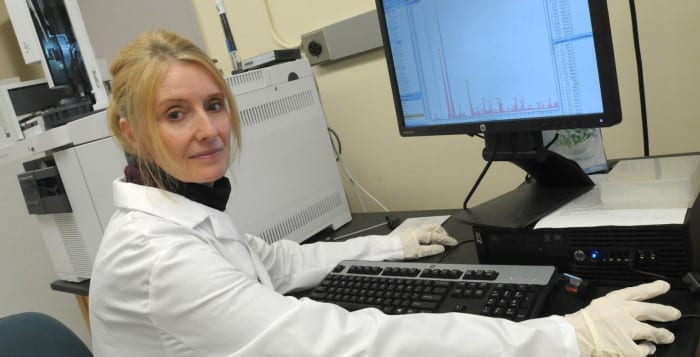By Daniel Dunaief
Patricia Thompson gets a call from her sister Kathy Hobson when people in San Angelo, Texas — where Thompson grew up and where her sister and brother live — when someone has cancer. They want to know what Thompson thinks of their treatment.
While Thompson is not a medical doctor, she has been working as a scientist to develop ways to discriminate high-risk patient populations from low-risk patients to limit “toxic treatments in low-risk individuals” and improve the efficacy of aggressive treatment in high risk-patients. The goal, she said, is to better treat patients based on the specific pathobiology of their disease.
Thompson, who came to Stony Brook University last October as a professor of pathology and associate director of Basic Research at the Cancer Center, is pleased with the support from the university.
“There’s a real convergence of factors, including a strong commitment from the leadership, the Simons Center and the university medical school faculty and staff at Stony Brook,” she said. “We all want to see the Stony Brook Cancer Center bring prestige to our community, attract the finest talent in cancer research and clinical care and attract innovators and job builders.”
Thompson said Cancer Center Director Yusuf Hannun, Medical School Research Dean Lina Obeid, Pathology Department Chairman Ken Shroyer, and Dean of the Medical School Ken Kaushansky have all led the charge.
Shroyer is pleased Thompson joined the effort. “Bringing her here was an incredible coup,” he said. She brings “real national prominence” and led one of the “most important clinical and translational research programs in breast and colorectal cancer.”
Thompson is committed to furthering her own research studies, while balancing between critical basic science discoveries and their clinical impact.
For some scientists, she wants to assist researchers as they move from the bench to the first human study. She helps them understand who needs to be involved to advance a potential diagnostic tool or novel treatment.
Still, she endorses the benefits of basic research. “Application is always an important long-term goal, but scientific exploration for new discovery is critical to advancements,” she said. Applied and basic research are “neither mutually exclusive approaches.”
Thompson studies colorectal and breast cancer because both have an inflammatory component and an immune element. She’s exploring what is shared between these two cancers as common targets for prevention and treatment.
Colon cancer provides a window that helps scientists and doctors understand the way cancer progresses.
“Our ability to study the premalignant to malignant progression in colorectal cancer has provided important basic knowledge of how cancers develop and taught us about how cells defend against tumorigenesis and how these systems fail,” she said.
Thompson went through some formative professional and personal experiences during graduate school that shaped her career. In the mid-1990s, she was studying an autoimmune disease in which she worked on an animal model with a neuroimmunologist.
“I wanted to know that all this work I was doing with animals was contributing to the disease in humans,” she said.
Around the same time, her father, Jim Thompson, who owned and operated Angelo Tool Company, learned he had stage IV colorectal cancer. He was diagnosed in 1995, before major advances in colorectal cancer treatment. Her father received compassionate care use of a new therapy, enabling him to live for three more years, considerably longer than his initial two-month prognosis. If he had been diagnosed five years later and received a platinum-based regimen, he would have “gained even more time,” she said.
Thompson said she and her family struggle with the fact that her father showed symptoms he kept to himself, largely out of fear. If his cancer had been detected earlier, she believes it is likely he could have been cured.
She suggests people not be “afraid of a cancer diagnosis” and recommends “routine screening” and consultation with a doctor if they show symptoms.
Thompson lives in Rocky Point with her husband, Michael Hogan, who is the vice president of life sciences at Applied DNA Sciences.
As for her work, Thompson believes her research might help physicians and their patients.
Her research aims to develop “diagnostic tests that help in prognosis” while identifying “patients that may achieve more benefit from aggressive chemotherapy,” she said.







